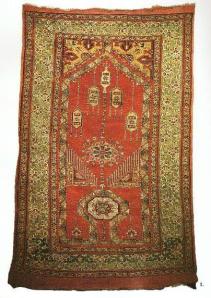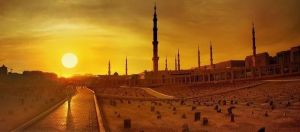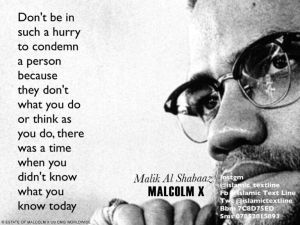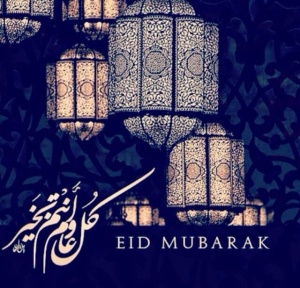All lofty and high praise be to Allah, The Most Honoured and The Majestic. Peace and blessings be upon the leader of the pious, the chief of al-Kha’shioon, Muhammad Ibn Abdullah, the Messenger of Allah, and on all his family and companions.
I begin by thanking Allah (Subhanahu WaTa’aala) for enabling me to shed a bit of light on the given topic. Salah is certainly not something taken lightly in the religion of Islam.
“The first thing of your religion that you will lose is Khushoo’, and the last thing that you will lose of your religion is Salah. There may be a person praying who has no goodness in him, and soon you will enter the masjid and not find anyone who has khushoo’.”
Salah is a pillar out of the five pillars of Islam.
Salah is a conversation with Our Lord.
Salah is a Mi’raaj for the Muslims.
Salah will increase our Iman and lead to Jannah. Discarding it will decrease our Iman and lead to Jahannam.
Allah (Subhanahu WaTa’aala) says, “And stand before Allah with obedience.” (2:238)
Regarding Salah, the Qur’an mentions, “And truly it is extremely heavy and hard except for al-Khashi’oon.” (2:45)
Salah is the greatest of the practical pillars of Islam and Khushoo’ in prayer is required by Shari’ah. When Iblis, the enemy of Allah, vowed to mislead and tempt the sons of Adam (peace be upon him) he said, “Then I will come to them from before them and behind them, from their right and from their left.” (7:17)
One of the most significant plots became to divert people from Salah by all means possible and to whisper to them during their prayer so as to deprive them of the joy of this worship and cause them to lose the reward for it.
“Successful indeed are the believers, those who offer their Salah with all solemnity and full submissiveness.” (23:1-2) Khushoo’ means calmness, serenity, tranquillity, dignity and humility. What makes a person have this Khushoo’ is fear of Allah (Subhanahu WaTa’aala) and the sense that He is always watching.
Hudhayfah (Allah be pleased with him) used to say, “Beware of the khushoo’ of hypocrisy.” He was asked, “What is the Khushoo’ of Hypocrisy?” He said, “When the body shows Khushoo’ but there is no Khushoo’ in the heart.”
Fudhayl ibn Ayadh (Allah have mercy upon him) said, “It was disliked for a man to show more Khushoo’ than he had in his heart.” One of them saw a man showing Khushoo’ in his shoulders and body, and said, “O so and so, Khushoo’ is here” – and he pointed to his chest, “not here” – and he pointed to his shoulders. (Al-Madarij)
Ibnul Quyyim (Allah have mercy upon him) who is known to be the ‘spiritual’ heart doctor said, explaining the difference between the Khushoo’ of true faith and the Khushoo’ of hypocrisy, “The Khushoo’ of true faith is when the heart feels aware and humble before the greatness and glory of Allah, and is filled with awe, fear and shyness, so that the heart is utterly humbled before Allah and broken, as it were, with fear, shyness, love and the recognition of the blessings of Allah and its own sins. So no doubt the Khushoo’ of the heart is followed by the Khushoo’ of the body. As for the Khushoo’ of hypocrisy, it is something that is put on with a great show, but there is no Khushoo’ in the heart.”
Khushoo’ is obligatory in prayer, and this includes calmness, meaning submission and humility. Whoever pecks like a crow in his Sujood (prostration) does not have Khushoo’, and whoever does not raise his head fully from Ruku (bowing) and pause for a while before going down into Sujood is not calm, because calmness implies doing things at a measured pace, so the person who does not do things at a measured pace is not calm. Whoever is not calm does not have Khushoo’ in his Ruku or Sujood, and whoever does not have Khushoo’ is a sinner…
Shaykhul Islam ibn Taymiyyah (Allah have mercy upon him) explained the things that help us to have Khushoo’, “Two things help us to develop Khushoo’, a strong desire to do what is obligatory, and weakness of distractions. With regards to the first, the strong desire to do what is obligatory; (this means that) a person strives hard to focus on what he is saying and doing, pondering upon the meaning of the Qur’an recitation, dhikr, duas, and keeping in mind the fact that he is speaking to Allah as if he sees Him SWT, for when he is standing in prayer, he is talking to his Lord. Ihsan means that you worship Allah as if you see Him, and if you cannot see Him, surely He can see you.”
The more the slave tastes the sweetness of Salah, the more attracted he will be to it, and this has to do with the strength of his Iman. The means of strengthening Iman are many, and this is why the Prophet (peace be upon him) used to say, “In your world, women and perfume have been made dear to me, and my joy is in prayer.”
According to another Hadith he (peace be upon him said), “Let us find comfort in prayer, O Bilal.” He (peace be upon him said), did not say, “Let us get it over and done with.”
With regard to the second, weakness of distractions, this means striving to push away all distractions that make you think of something other than the prayer itself, and warding off thoughts that keep your mind off the purpose of the prayer. This is something which differs from one person to another, because the extent of waswasah (evil thoughts) has to do with the extent of one’s doubts and desires and the heart’s focus and dependence on what it loves, and its efforts to avoid what it dislikes.
After having read thus far, I hear some of you say, “well how does one go about acquiring this Khushoo?” One of the most important things one needs to remember is preparing oneself ‘properly’ for Salah. A lack of this or preparing inadequately is the greatest cause for deficiency in Khushoo’. We should be preparing from the moment we hear the Adhan, repeat the words the Muaddhin says, then recite Durood and the dua after the Adhan. We normally perform our Wudhu at this stage, again, this must be done thoroughly. One must ensure each part is rubbed correctly and fully not leaving a single area dry nor any hair left out (where applicable). Start Wudhu with Bismillah and Alhumdu Lillah, and ending it with the prescribed dua in the Sunnah. A forgotten Sunnah in Wudhu is using the Siwak/Miswak, it is actually Sunnah Muakkadah (emphasised sunnah) to utilise the Miswak whilst performing Wudhu, i.e. it should not be left out.
When one starts Salah it should not be rushed and he/she should move from one position to another slowly and calmly. Abu Qatadah (Allah be pleased with him) said, “The Prophet (peace be upon him) said, “The worst type of thief is the one who steals from prayer.’ He asked. ‘O Messenger of Allah, how can a person steal from his prayer?’ He (peace be upon him) said, ‘By not doing rukoo and sujood properly.’ (Ahmad and alHakim)
Hammad ibn Salamah (Allah have mercy upon him) said, “I have never stood up for prayer once without imagining that the fire of Hell is before my eyes.”
Just like in worldly affairs we think of different strategies and techniques to boost our business, to make our lives easier and comfortable, similarly we must plan ways to rectify our Salah. Here is one prescribed in the Sunnah:
The Prophet (peace be upon him) said, “Remember death in your prayer, for the man who remembers death during his prayer will surely pray properly, and (also) pray the prayer of a man, who does not think that he will pray any other prayer (after this).”
Lastly, Abu Ayyub (Allah be pleased with him) was advised by the Prophet (peace be upon him);
“When you stand up to pray, pray a farewell prayer.”
O Allah! Grant us all the ability to pray Salah daily with Khushoo’ and devotion. And make Salah the coolness of our eyes. Ameen.
Ismail Ibn Nazir Satia (In dire need of Allah’s forgiveness, mercy and pleasure).
1st Muharram 1436


 “I have been blessed to visit the Holy City of Mecca, I have made my seven circuits around the Ka’ba, led by a young Mutawaf named Muhammad, I drank water from the well of the Zam Zam. I ran seven times back and forth between the hills of Mt. Al-Safa and Al Marwah. I have prayed in the ancient city of Mina, and I have prayed on Mt. Arafat.” “There were tens of thousands of pilgrims, from all over the world. They were of all colors, from blue-eyed blondes to black-skinned Africans. But we were all participating in the same ritual, displaying a spirit of unity and brotherhood that my experiences in America had led me to believe never could exist between the white and non-white.”
“I have been blessed to visit the Holy City of Mecca, I have made my seven circuits around the Ka’ba, led by a young Mutawaf named Muhammad, I drank water from the well of the Zam Zam. I ran seven times back and forth between the hills of Mt. Al-Safa and Al Marwah. I have prayed in the ancient city of Mina, and I have prayed on Mt. Arafat.” “There were tens of thousands of pilgrims, from all over the world. They were of all colors, from blue-eyed blondes to black-skinned Africans. But we were all participating in the same ritual, displaying a spirit of unity and brotherhood that my experiences in America had led me to believe never could exist between the white and non-white.”







